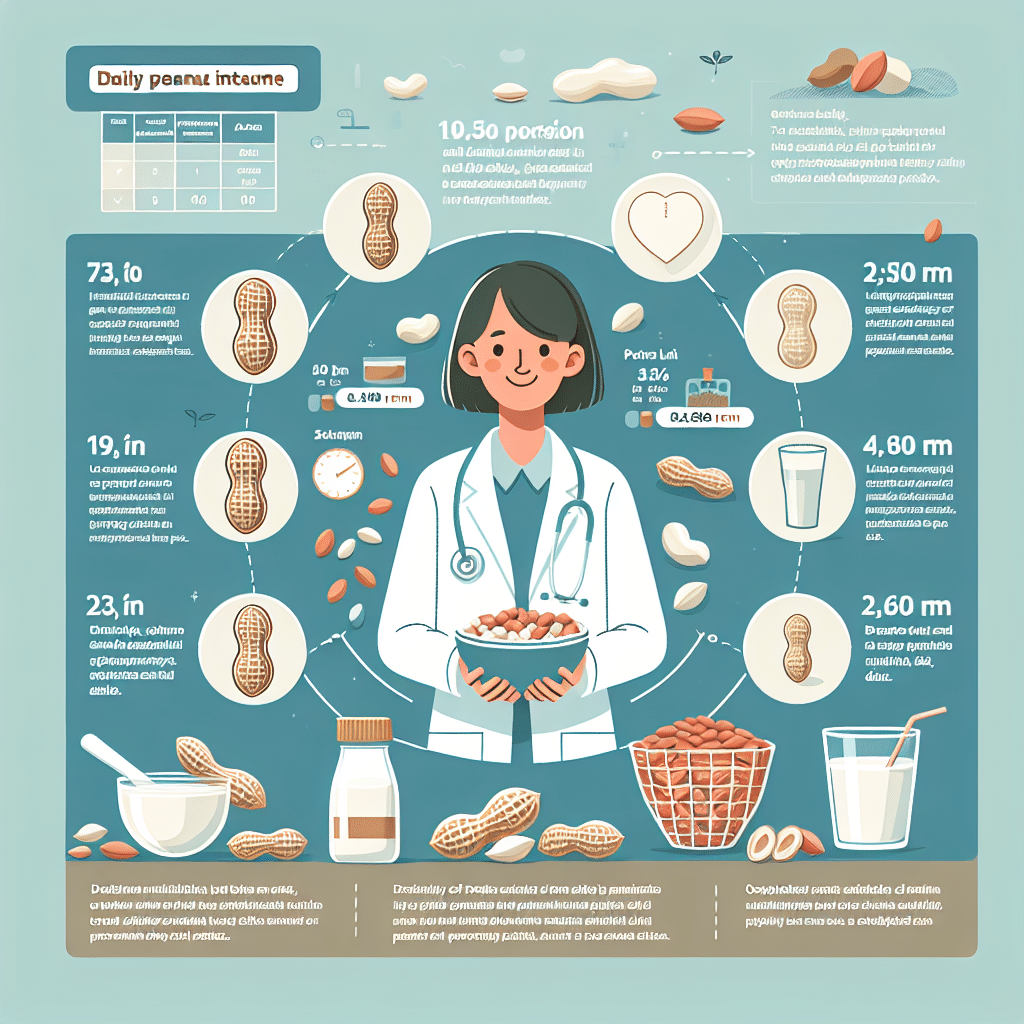How Many Peanuts Can I Eat A Day?
-
Table of Contents
- Optimal Daily Peanut Intake: Balancing Health and Enjoyment
- Understanding the Nutritional Value of Peanuts
- Recommended Daily Intake of Peanuts
- Health Benefits of Eating Peanuts
- Potential Risks of Overconsumption
- How to Incorporate Peanuts into Your Diet
- Case Studies and Statistics
- Conclusion: Finding the Right Balance
- Enhance Your Diet with ETprotein’s High-Quality Protein Products
Optimal Daily Peanut Intake: Balancing Health and Enjoyment

Peanuts are a beloved snack enjoyed by millions around the world. Not only are they delicious, but they also offer a variety of health benefits due to their nutrient-rich profile. However, as with any food, moderation is key. This article explores how many peanuts you can safely consume each day without compromising your health.
Understanding the Nutritional Value of Peanuts
Peanuts are a powerhouse of nutrients, providing a good source of protein, healthy fats, vitamins, and minerals. They contain heart-healthy monounsaturated and polyunsaturated fats, which can help lower bad cholesterol levels. Peanuts are also rich in antioxidants, fiber, vitamin E, magnesium, and potassium. However, they are calorie-dense, which means it’s easy to overeat them.
Recommended Daily Intake of Peanuts
The recommended daily intake of peanuts varies depending on several factors, including age, sex, weight, and activity level. However, a general guideline is that adults should consume about 1 to 2 ounces (28 to 56 grams) of nuts, including peanuts, per day. This portion equates to approximately a small handful or ¼ to ½ cup of shelled peanuts.
Health Benefits of Eating Peanuts
- Heart Health: Regular consumption of peanuts has been linked to a reduced risk of heart disease, thanks to their beneficial fats and antioxidants.
- Weight Management: Peanuts can help in weight management due to their satiating properties, which can reduce overall calorie intake by keeping you fuller for longer.
- Diabetes Prevention: The low glycemic index of peanuts makes them a good snack for managing blood sugar levels, potentially reducing the risk of type 2 diabetes.
- Reduced Risk of Gallstones: Studies have shown that eating peanuts may lower the risk of gallstones, especially in women.
Potential Risks of Overconsumption
While peanuts offer numerous health benefits, overconsumption can lead to several issues:
- Weight Gain: Due to their high calorie content, excessive peanut consumption can contribute to weight gain if not balanced with physical activity.
- Allergies: Peanuts are one of the most common food allergens, and allergic reactions can be severe or even life-threatening.
- Aflatoxins: Peanuts can sometimes contain aflatoxins, which are toxic substances produced by certain molds. However, strict regulations and processing methods minimize this risk.
How to Incorporate Peanuts into Your Diet
There are many ways to enjoy peanuts as part of a balanced diet:
- As a snack, either raw or roasted
- Incorporated into stir-fries or salads for added crunch
- Blended into smoothies for a protein boost
- As peanut butter spread on whole-grain toast or fruit slices
Case Studies and Statistics
Research has consistently shown the benefits of including nuts like peanuts in your diet. For instance, the Nurses’ Health Study and the Health Professionals Follow-up Study found that two servings of nuts a week could reduce the risk of heart disease by 23-38%. Another study published in the Journal of Nutrition showed that frequent nut consumption is associated with a reduced risk of cardiovascular disease and all-cause mortality.
Conclusion: Finding the Right Balance
In conclusion, while peanuts are nutritious and can be part of a healthy diet, it’s important to consume them in moderation. A daily intake of 1 to 2 ounces of peanuts is recommended for most adults. By enjoying peanuts in the right amounts, you can reap their health benefits without the risks associated with overconsumption.
Enhance Your Diet with ETprotein’s High-Quality Protein Products
If you’re looking to complement your peanut intake with other high-quality protein sources, consider ETprotein’s range of organic bulk vegan proteins. Their products, including peanut protein, are characterized by a neutral taste, non-GMO, allergen-free attributes, and high purity levels, making them an excellent addition to any diet.
About ETprotein:
ETprotein, a reputable protein and L-(+)-Ergothioneine (EGT) Chinese factory manufacturer and supplier, is renowned for producing, stocking, exporting, and delivering the highest quality organic bulk vegan proteins and L-(+)-Ergothioneine. They include Organic rice protein, clear rice protein, pea protein, clear pea protein, watermelon seed protein, pumpkin seed protein, sunflower seed protein, mung bean protein, peanut protein, and L-(+)-Ergothioneine EGT Pharmaceutical grade, L-(+)-Ergothioneine EGT food grade, L-(+)-Ergothioneine EGT cosmetic grade, L-(+)-Ergothioneine EGT reference grade and L-(+)-Ergothioneine EGT standard. Their offerings, characterized by a neutral taste, non-GMO, allergen-free attributes, with L-(+)-Ergothioneine purity over 98%, 99%, cater to a diverse range of industries. They serve nutraceutical, pharmaceutical, cosmeceutical, veterinary, as well as food and beverage finished product distributors, traders, and manufacturers across Europe, USA, Canada, Australia, Thailand, Japan, Korea, Brazil, and Chile, among others.
ETprotein specialization includes exporting and delivering tailor-made protein powder and finished nutritional supplements. Their extensive product range covers sectors like Food and Beverage, Sports Nutrition, Weight Management, Dietary Supplements, Health and Wellness Products, and Infant Formula, ensuring comprehensive solutions to meet all your protein needs.
As a trusted company by leading global food and beverage brands and Fortune 500 companies, ETprotein reinforces China’s reputation in the global arena. For more information or to sample their products, please contact them and email sales(at)ETprotein.com today.












